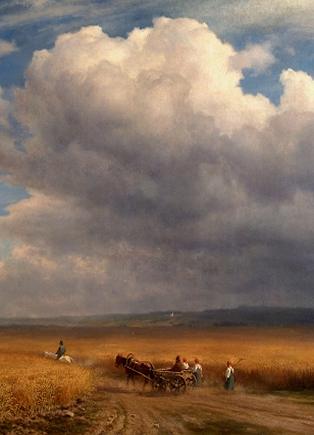Viacheslav Ivanov (1866-1949) was first educated in Moscow, where he studied history and philosophy, and then in Berlin where he studied Roman law and economics under Theodor Mommsen.
He was also much interested in the philosophy of Friedrich Nietzsche and the German Romantics generally, especially Novalis and Friedrich Hölderlin.
Ivanov married Darya Mikhailovna Dmitrievskaya, the sister of a close childhood friend in 1886, studied archaeology in Rome, and in 1893 met his second wife, Lydia Zinovieva-Annibal. After receiving their divorces, the two
married in 1899, first settling in Athens, then moving to Geneva, and making archaeological pilgrimages to Egypt and Palestine.
In 1903, The Ivanovs made a celebrated return to St. Petersburg, where they established the most fashionable literary salon of the era, entertaining Symbolist writers and others in Wednesday soirees
that rarely got started until a 2 am supper was served. Both Ivanovs were bisexual, but Viacheslav was gravely stricken by his wife's death in 1907. Attempts to get Akhmatova to leave her immature husband
came to nothing. Finally, apparently under orders
from Darya Mikhailovna, who appeared in a dream, Viacheslav then married a step-daughter, the daughter of his first wife, in 1913. Tragedy struck again in 1920, however, when
Vera died. Heart-broken, Ivanov moved to Baku, where he held the University Chair of Classical Philology. At last, indifferent to turmoil in Soviet Russia, and aloof from emigre politics, Ivanov settled in
Rome, being received into the Russian Catholic Church in 1926.

Ivanov continued to write until nearly the end of a tangled but fruitful life: poems, plays, translations and scholarly studies. He was the most erudite of Symbolist poets, indeed of
Russian poets altogether, with an enviable learning and range of reference that's reflected in his poems.
Ivanov was much given to solemn and majestic pieces, but this is something different. As often the case with Symbolist poems, the precise meaning is difficult to pin down, beyond the conventional picture of artists being eternal nomads, settling briefly and then moving on to fresh pastures.
Кочевники Красоты
Вам — пращуров деревья
И кладбищ теснота!
Нам вольные кочевья
Судила Красота.
Вседневная измена,
Вседневный новый стан:
Безвыходного плена
Блуждающий обман.
О, верьте далей чуду
И сказке всех завес,
Всех весен изумруду,
Всей широте небес!
Художники, пасите
Грез ваших табуны;
Минуя, всколосите —
И киньте — целины!
И с вашего раздолья
Низриньтесь вихрем орд
На нивы подневолья,
Где раб упрягом горд.
Топчи их рай, Аттила, —
И новью пустоты
Взойдут твои светила,
Твоих степей цветы!
1904
The TTS Audio Recording is:
The poem is in iambic trimeters rhymed AbAb, where the feminine rhyme is shown in upper case:
Вам — пра́щуров дере́вья 3A
И кла́дбищ теснота́! 3b
Нам во́льные коче́вья 3A
Суди́ла Красота́. 3b
The only translation known to me on the Internet is the accomplished rendering by Maurice Bowra. I give his first two stanzas:
Wide acres you inherit,
And graveyards populous;
A tameless nomad spirit
Is Beauty’s fate for us.
For us a daily treason,
New camp-grounds every day.
The inexorable prison
We cheat, and break away.
Against my usual practice I have reproduced the feminine rhyme in 'Beauty's Nomads, partly because it's easy to do, and partly
because the rendering is rather 'thin' without it. Thus the first stanza in masculine rhymes only:
What, fathers, is destiny
when cemeteries are full?
True, nomads, you are free
but not from beauty’s pull
Your fathers went before you
though thick the graveyards grow,
free nomads having borne you,
in beauty you will go.
Daily comes the treason
of moving camp each day
and hopeless any reason
to lead us from our way.
Invest in distant stories,
spread veils before your eyes.
Spring has emerald glories
beneath extended skies.
Artists, ever drifting,
how wide those dreaming bands:
cleanse, resettle, be sifting,
and flee original lands.
Across vast distances
come whirlwind hordes again,
and proud the instances
of slaves that were free men.
Attila, come and trample,
new waste our paradise:
with flowers our steppes are ample
to fill the starry skies.
1. Bristol, E., A History of Russian Poetry (O.U.P. 1991) 196-9.
Russian poem translations on this site: listing.